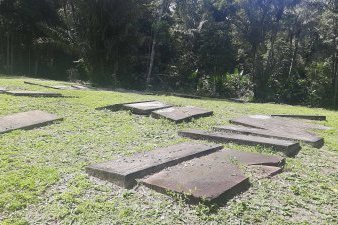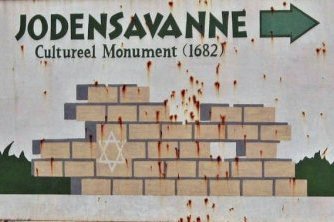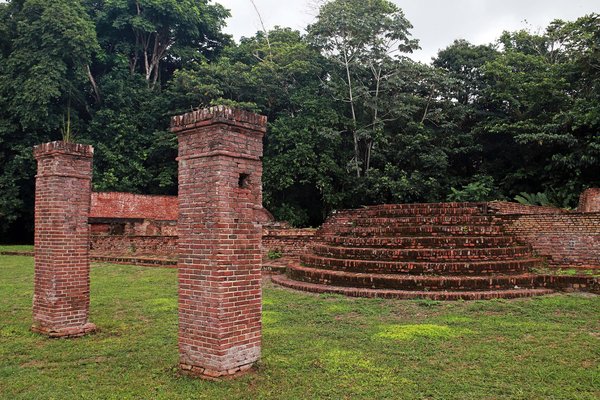Suriname
Jodensavanne
The Jodensavanne Archaeological Site: Jodensavanne Settlement and Cassipora Creek Cemetery comprises the remains of early Jewish colonies.
The sites date from the second half of the 17th century, when Jewish settlers from Europe established agricultural plantations here and developed an autonomous community. The Beraha VeSalom synagogue within the property is considered the first synagogue of architectural significance in the New World.
Community Perspective: the site lies not far from the international airport and can be combined with a trip in or out of the country. The settlement remains are quite basic.
Site Info
Official Information
- Full Name
- Jodensavanne Archaeological Site: Jodensavanne Settlement and Cassipora Creek Cemetery (ID: 1680)
- Country
- Suriname
- Status
-
Inscribed 2023
Site history
History of Jodensavanne
- 2023: Inscribed
- Inscribed
- Type
- Cultural
- Criteria
- iii
Links
- UNESCO
- whc.unesco.org
- Related
-
- jodensavanne.org — Jodensavanne Foundation
All Links
UNESCO.org
- whc.unesco.org — whc.unesco.org/
Related Resources
- jodensavanne.org — Jodensavanne Foundation
Community Information
- Community Category
- Archaeological site: Other
Travel Information
Recent Connections
-
Built in the 17th century
"The Jodensavanne Settlement, founded i… -
Cemeteries
Cassipora Creek Cemetery + "Also includ… -
Slavery
"Archival information indicates that th…
Connections of Jodensavanne
- Architecture
-
-
Brick architecture
synagogue "was constructed with imported European bricks in a Dutch vernacular style" (AB ev)
-
- World Heritage Process
-
-
Inscribed on a single criterion only
Crit iii -
Perfect Inscriptions
2023
-
- Religion and Belief
-
-
Jewish religion and culture
"two component parts that illustrate early Jewish colonisation attempts in the New World" (AB ev)
-
- Human Activity
-
-
Maroonage
Located amidst Indigenous territory, the settlements were inhabited, owned, and governed by Jews who lived there together with free and enslaved persons of African and Indigenous descent. (Brief synthesis OUV) -
Slavery
"Archival information indicates that the use of the cemetery by free and enslaved persons who lived and worked at Jodensavanne began before 1794" (AB ev)
-
- Constructions
-
-
Cemeteries
Cassipora Creek Cemetery + "Also included in the Jodensavanne component part is the African-Creole cemetery, Nengre Berpe" (AB ev)
-
- Timeline
-
-
Built in the 17th century
"The Jodensavanne Settlement, founded in the 1680s ... The Cassipora Creek Cemetery is the remnant of an older settlement founded in the 1650s" (AB ev)
-
News
No news.
Community Reviews
Show full reviews
There is a bus from Paramaribo 3 or 4 times a week, leaving for Casipora at 8.30h. It passes right by the access road to the Jodensavanne and takes around 2 hours, including a shopping stop of about 20 minutes at a Chinese supermarket along the way.
The driver told me the return bus passes around 12.10h but when I left Jodensavanne at noon, the caretaker said the bus will only pass the police checkpoint, which is close to the bridge over the Suriname river. So I walked there, arriving around 12.20 and waited and waited until a car stopped around 12.50h and asked me where I am going, and took me back to Paramaribo.
I spent a bit over an hour which is enough for the site. I would have liked to spend a bit more time at the very hot and steamy little visitor center with interesting written texts on the Portuguese-Jewish community in Amsterdam, the Jewish communities in Paramaribo and also on Curacao, and the links between them.
The site consists of a Creole forest cemetery with mostly wooden grave markers, slightly dilapidated, a Portuguese-Jewish cemetery with quite elaborately carved lying gravestones and the ruins of the synagogue near the river, along with a few fundaments of houses. There are information signs with good information, so I would say a guide is not necessary.
When I left, the caretaker had appeared and collected the entry fee of 200 SRD (around €6) and advertised …
Keep reading 0 comments
I may dislike religious sites in general but I'm extra negative about this one. It basically tries to show a "testament to Judaism in the Americas" which means that Jews came to the South Americas in the settler ages as seen by the founding year of the site: 1682. The synagogue remains are quite basic with mainly the ground bricks, steps and short remains of the walls to be seen. At one point it must have been a nice settlement away from the main that is now Paramaribo. It also contains a cemetery which are many large rectangles on the ground. If all religions would start to add locations for their cemeteries around the world it would be full of sites. So yes, Jewish settlement in this part of the world is pretty interesting but that's about it, I mean they have antique synagogues in the city too if I'm not mistaken.
Getting here is not difficult but obviously you need to arrange transportation. What I did and what you may want to do as well is combine this wit ha trip to or from the airport. It's only a bit east of the airport and Paramaribo is a long trip in and out if you are coming only for the settlement remains but it's still alright if you can't manage it for timing reason. My flight into Suriname arrived shortly before midnight and with the lengthy visa payment it wasn't until 1am to be at my hotel. So …
Keep reading 0 comments
